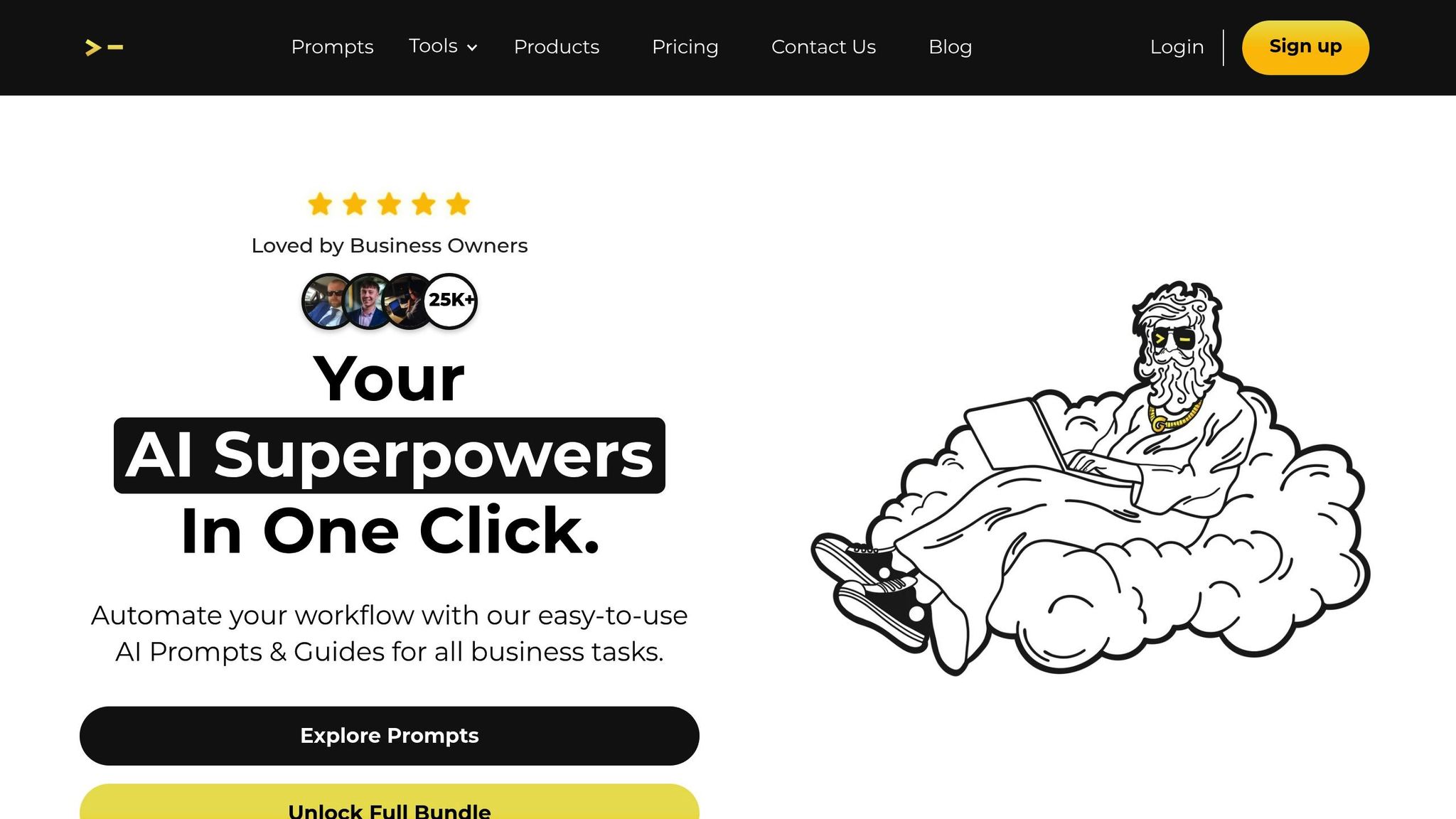Best Prompt Library vs Prompt Marketplace: Which Should You Choose

AI prompts are essential for professionals using tools like ChatGPT, Claude, or Midjourney. But should you choose a prompt library or a prompt marketplace? Here's the quick answer:
- Prompt Libraries: Offer organized collections of thousands of prompts for various tasks (e.g., marketing, SEO, productivity). They’re ideal for frequent users or teams looking for a wide range of prompts at a fixed price. Example: God of Prompt provides 30,000+ prompts for $150 with lifetime updates.
- Prompt Marketplaces: Allow you to buy specific prompts individually, often priced between $1 and $50. Perfect for occasional users or those with niche needs. Marketplaces rely on user ratings to guide quality.
Quick Comparison
| Feature | Prompt Libraries | Prompt Marketplaces |
|---|---|---|
| Pricing | One-time fee or subscription ($37–$150) | Pay-per-prompt ($1–$50) |
| Content | Pre-curated, organized collections | User-generated, individual prompts |
| Best For | Frequent users, teams, multi-tasking | Specific or one-off tasks |
| Updates | Regular updates included | Real-time updates by creators |
| Quality Control | Professionally curated | Based on user ratings and reviews |
If you need a wide range of prompts for ongoing use, go for a library. If you only need specific, one-time solutions, a marketplace is better. Your choice depends on your workflow, budget, and AI needs.
3 BEST AI Prompt Marketplaces to Buy and Sell Your AI Prompts
Prompt Libraries: Features and Benefits
Prompt libraries serve as centralized hubs for professionally curated prompts, offering a well-organized alternative to scattered resources. These collections bring together thousands of prompts in one place, making it easier for users to find exactly what they need.
Main Features of Prompt Libraries
A key strength of prompt libraries lies in their organization. Prompts are grouped into clear, logical categories that align with real-world business tasks. Whether you're tackling marketing, SEO, or productivity challenges, these libraries streamline the process by offering targeted prompts for specific needs.
Regular updates keep the library aligned with the latest advancements in AI and shifting business demands. This way, users always have access to up-to-date and relevant prompts without needing to search elsewhere.
Many libraries also support multiple AI platforms through a single interface. Instead of juggling separate collections for tools like ChatGPT, Claude, and Midjourney, users can find prompts for all these platforms in one place.
Additionally, bulk access provides an affordable way to tap into extensive prompt collections, saving both time and money.
These features create a range of benefits that professionals can leverage in their daily work.
Benefits for Professionals
Prompt libraries are a game-changer for busy professionals, offering clear advantages through their structured approach. By cutting down the time spent searching for or creating prompts, these libraries allow teams to focus on executing their projects more efficiently.
Fixed pricing models simplify budgeting. Whether through one-time purchases or subscription plans, users can avoid the unpredictability of per-prompt costs, making it easier to calculate the return on investment for AI-related initiatives.
Consistency in quality is another benefit. Since prompts are professionally curated, tested, and refined before being added, users can skip the trial-and-error phase often associated with creating or buying individual prompts.
The broad coverage of business functions ensures that professionals can handle a variety of tasks without needing to switch between multiple sources. From writing and marketing to data analysis, these libraries provide prompts that work seamlessly across different operations.
Example: God of Prompt

A great example of an effective prompt library is God of Prompt, which highlights how these features can enhance professional workflows. With over 30,000 AI prompts organized into specific business categories, it showcases the value of a well-structured collection.
The platform categorizes prompts across key areas like marketing, finance, e-commerce, education, sales, and productivity. This organization allows users to quickly locate relevant prompts without sifting through unrelated material.
Lifetime updates are another standout feature. Users who purchase bundles gain ongoing access to new prompts and improvements without additional charges, making it a smart long-term investment.
The library's Notion-based interface is particularly appealing for professionals already familiar with Notion. This setup makes navigation intuitive and allows for seamless integration into existing workflows.
God of Prompt offers flexible pricing options to suit different needs, from a $37 Writing Pack tailored for content creators to a $150 Complete AI Bundle designed for broader business applications. A 7-day money-back guarantee further reduces the risk, giving users the chance to test the library's value before fully committing.
For those with unique needs, the platform also supports custom prompt generation, enabling users to request specific prompts not already included in the library. This blend of comprehensive pre-built collections and customizable options ensures that both common and specialized tasks are covered effectively.
Prompt Marketplaces: Features and Benefits
Prompt marketplaces act as dynamic platforms where creators can list and sell individual prompts. Unlike static libraries with predefined collections, these marketplaces operate more like app stores, offering an ever-changing selection of prompts from a variety of contributors. This setup introduces unique pricing models and quality control measures, which play a key role in their effectiveness.
Main Features of Prompt Marketplaces
These platforms typically follow a pay-per-prompt model, allowing users to purchase specific solutions tailored to their needs. This structure encourages a diverse range of creator-driven content. Anyone, from seasoned professionals to hobbyists, can submit prompts for sale, leading to an array of styles and specialized approaches. You'll find prompts created by experts in fields like marketing, data science, creative writing, and beyond.
To help users identify the best options, marketplaces rely on user ratings, purchase counts, and feedback. These tools make it easier to distinguish high-performing prompts from less effective ones.
Advanced search and filtering capabilities further enhance the user experience. You can sort prompts by popularity, price, or recent updates, and even narrow results to specific use cases such as social media marketing, code generation, or visual content creation.
Revenue-sharing models are another key feature, allowing creators to earn a significant share of the proceeds. This incentivizes high-quality submissions and ensures a steady flow of fresh, specialized content for buyers.
Benefits for Professionals
Prompt marketplaces are particularly valuable for professionals seeking tailored solutions to specific problems. Whether you're looking for a prompt to craft product descriptions for outdoor gear or generate engaging social media captions for a restaurant, you'll find options designed to meet those exact needs.
The low-cost, pay-per-prompt approach makes experimentation more accessible. Instead of investing in a full collection, you can test individual prompts without a significant financial commitment. This flexibility is ideal for teams exploring AI tools or individuals working on one-off projects.
These platforms also excel at offering niche prompts that might not be available in broader libraries. This focus on specialization ensures that professionals can find highly targeted solutions.
Another advantage is the ability to access the latest trends and techniques. As AI capabilities evolve, creators can quickly update their offerings, giving professionals immediate access to cutting-edge strategies without waiting for periodic library updates.
Finally, the transparent rating and review system empowers professionals to make informed choices. By highlighting prompts with proven success, users can confidently select options that align with their goals, while creators with specialized knowledge can earn additional income by sharing their expertise.
sbb-itb-58f115e
Main Differences: Libraries vs Marketplaces
Prompt libraries and marketplaces serve the same purpose - offering AI prompts - but they differ significantly in their pricing, quality control, and overall user experience. Let’s break down how these two options stack up against each other.
Comparison Table: Libraries vs Marketplaces
| Feature | Prompt Libraries | Prompt Marketplaces |
|---|---|---|
| Pricing Model | Subscription or one-time fee ($37-$150) | Pay-per-prompt ($1-$50 per prompt) |
| Access Method | Full collection access via organized platform | Individual prompt purchases |
| Quality Control | Professionally curated for consistency | User ratings and reviews |
| Content Updates | Regularly updated collections with lifetime access | Real-time additions by creators |
| Refund Policy | 7-day money-back guarantee on bundles | Varies by platform, often no refunds |
| Search & Organization | Pre-categorized collections by use case | Advanced filters by popularity and price |
| Creator Model | Managed by a professional team | Open marketplace with revenue sharing |
| Best For | Comprehensive workflow integration | Specific, one-off solutions |
Breaking Down the Differences
Taking a closer look at these differences reveals why users might choose one over the other depending on their needs.
Libraries, such as God of Prompt, offer extensive collections at a one-time cost - like $150 for over 30,000 prompts, which breaks down to less than $0.01 per prompt. This makes libraries a smart choice for those who need a wide range of prompts for ongoing use. Marketplaces, on the other hand, charge between $1 and $50 per individual prompt, making them ideal for users who need a specific, one-time solution.
Quality control is another key factor. Libraries are curated by professional teams to maintain consistent standards, ensuring all prompts meet a certain level of reliability. Marketplaces rely on user feedback, with ratings and reviews playing a big role in helping buyers assess quality. This can lead to more variability in the user experience.
For professionals looking to streamline workflows, libraries stand out. Their prompts are often designed to work together seamlessly across various business functions. For example, God of Prompt’s Complete AI Bundle includes a coordinated set of prompts tailored for marketing, sales, and productivity, offering a fully integrated solution. In contrast, marketplaces provide standalone prompts, which may not align as easily with existing processes.
Lastly, updates and support differ between the two. Libraries provide regularly updated collections, often accompanied by detailed guides and learning resources to help users get the most out of their investment. Marketplaces, while offering real-time updates from individual creators, usually lack the structured learning paths that libraries provide. This makes libraries a better fit for users who value a more guided and cohesive experience.
How to Choose: Recommendations by User Type
Deciding between a prompt library and a prompt marketplace comes down to your specific needs, budget, and how you intend to use AI prompts in your work. Below, we break down which user groups are best suited for each option and what factors to keep in mind.
When to Choose a Prompt Library
If you're a frequent AI user or part of a business that relies on AI for daily operations, a prompt library can be a smart choice. These libraries are ideal for handling multiple tasks like marketing, content creation, customer service, and productivity. For example, God of Prompt's Complete AI Bundle offers a wide range of resources at a fixed, low cost per prompt, making it an excellent option for heavy users.
- Teams and agencies: Libraries are particularly useful for groups that need shared access. A marketing agency, for instance, can provide its copywriters, strategists, and account managers with access to the same curated collection of prompts. This shared system not only ensures consistent quality but also simplifies training by creating a unified workflow.
- Budget-conscious professionals: A fixed-cost library can be a cost-effective solution for those looking to avoid the variable expenses of buying individual prompts. With a comprehensive library, you get access to a wide range of prompts that cover multiple business needs without worrying about additional costs.
- Organized workflows: Libraries typically come with pre-structured guides and categories, helping users maintain consistency across projects. Instead of piecing together prompts from various sources, you can rely on a cohesive system that supports efficient workflows.
When to Choose a Prompt Marketplace
A prompt marketplace might be a better fit for users with occasional or specific needs.
- Occasional AI users: If you only need prompts for one-off projects - like a unique social media campaign or solving a specific technical issue - buying individual prompts from a marketplace can be more practical than investing in a full library.
- Niche requirements: For highly specialized prompts tailored to unique industries or specific use cases, marketplaces often provide options that may not be included in a general library.
Key Factors to Consider
In addition to your user type, there are several practical aspects to evaluate when making your choice.
- Time-saving organization: Libraries often feature pre-organized categories and carefully tested prompt combinations. For example, God of Prompt's business-focused collection allows users to quickly find prompts for tasks like sales emails, marketing copy, or productivity improvements - all without needing to sift through unrelated options. Marketplaces, on the other hand, rely on user ratings, which can vary in quality.
- Budget predictability: Libraries offer a fixed-cost model, often with perks like lifetime access and regular updates, making it easier to plan your expenses. In contrast, marketplaces may lead to unpredictable costs if you're purchasing prompts individually over time.
- Tool integration: Consider how well each option fits into your existing workflow. Libraries often include prompts designed to integrate smoothly with popular business tools and software. For example, God of Prompt's resources are structured to work seamlessly with common applications, while marketplace prompts may require extra effort to adapt.
- Learning and support: Libraries typically come with additional resources like guides, tips, and structured learning paths to help users get the most out of their investment. For instance, God of Prompt includes how-to guides alongside its prompts, ensuring users not only know what to use but also how to use it effectively. In contrast, marketplaces may offer standalone prompts with little to no educational context.
Conclusion: Pick the Right Option for Your Needs
The choice between prompt libraries and marketplaces ultimately depends on how you use AI and what you need from it.
Prompt libraries are ideal for those who need reliable, all-encompassing solutions. They’re particularly valuable for professionals, teams, and businesses that rely on AI across various tasks. With a fixed-cost model, you avoid unexpected expenses, and their organized collections save you the hassle of hunting for individual prompts. For instance, God of Prompt’s bundle offers a fixed price, lifetime updates, and a well-rounded selection.
On the other hand, prompt marketplaces are better suited for occasional or specialized tasks. If your AI needs are sporadic or you’re looking for highly specific prompts, marketplaces let you pay only for what you use. This flexibility is perfect for users who don’t require a continuous library of resources.
When deciding, think about budget stability, time investment, and how AI fits into your workflow. Libraries often deliver better value over time with their structured approach and added learning tools. Marketplaces, however, offer the freedom to pick and choose without long-term commitments. It’s also worth considering how much effort you want to put into evaluating individual prompts versus having a curated collection ready to go.
For seasoned AI users, a pre-curated library often ensures consistent results and greater efficiency. Whether you go for a library or a marketplace, make sure your choice aligns with your industry needs, offers clear organization, and provides the right level of support for your expertise.
Take a moment to assess your AI usage and pick the option that will simplify your workflow and enhance productivity.
FAQs
How can I decide if a prompt library or a prompt marketplace is more cost-effective for my business?
To figure out which option works best for you, consider your specific needs and budget. Prompt libraries often offer a collection of pre-designed prompts, sometimes at no cost or as part of a subscription. These are a great choice if you're looking for a wide range of general prompts without spending a lot upfront. On the flip side, prompt marketplaces typically sell individual, high-quality prompts tailored to specific needs. Prices usually range from $1.99 to $9.99 per prompt, making them a smart option for businesses that require precision for particular tasks.
Another factor to weigh is time savings. Ready-made prompts can save you a lot of time compared to creating your own, especially for more complex or specialized needs. If having something highly customized is essential, hiring a professional to craft custom prompts could be a worthwhile investment. In the end, it’s all about finding the right balance between cost, quality, and your business objectives.
How does quality control differ between prompt libraries and prompt marketplaces?
The key distinction in quality control comes down to how prompts are reviewed and curated. Prompt marketplaces typically implement a structured review process to ensure prompts meet specific standards and deliver the results they promise. This approach provides users with a more consistent and dependable experience.
On the other hand, prompt libraries, particularly those driven by communities, often lack formal review systems. While this can lead to a broader selection of prompts, the quality and effectiveness can vary greatly. Deciding between the two depends on whether you value consistency or a wider range of options.
Can prompt libraries and marketplaces work with tools like ChatGPT and Midjourney to improve workflow efficiency?
Yes, prompt libraries and marketplaces can work hand-in-hand with popular AI tools like ChatGPT and Midjourney, streamlining workflows in a big way. For instance, some libraries are designed to integrate directly with AI platforms, letting users access and use pre-curated prompts without the hassle of switching apps or copying and pasting content manually.
These integrations simplify the creative process, saving time and cutting down on unnecessary steps. Whether you're tackling business tasks, boosting productivity, or diving into creative projects, this compatibility helps ensure a faster and more efficient experience.






















